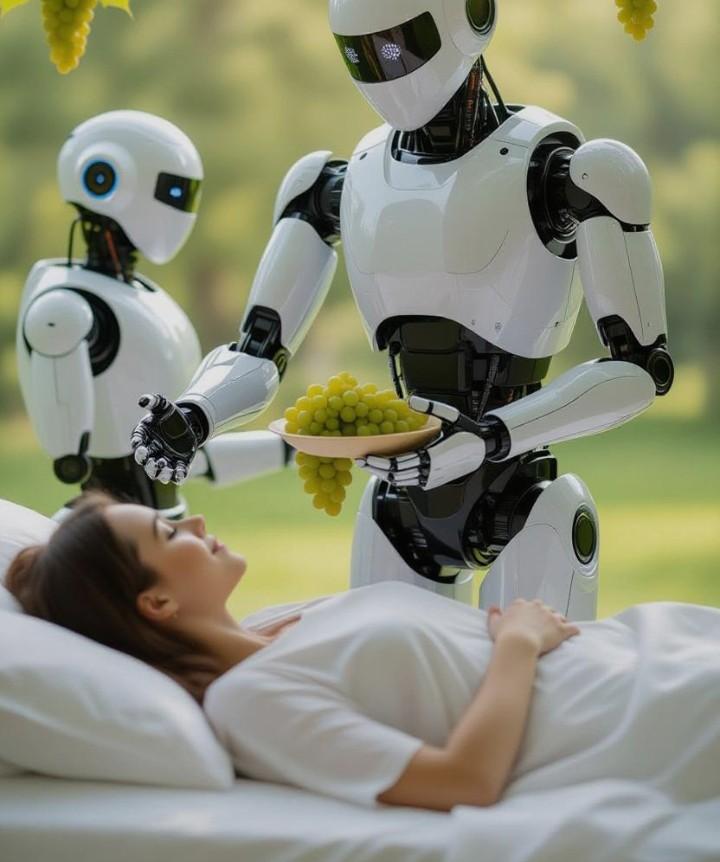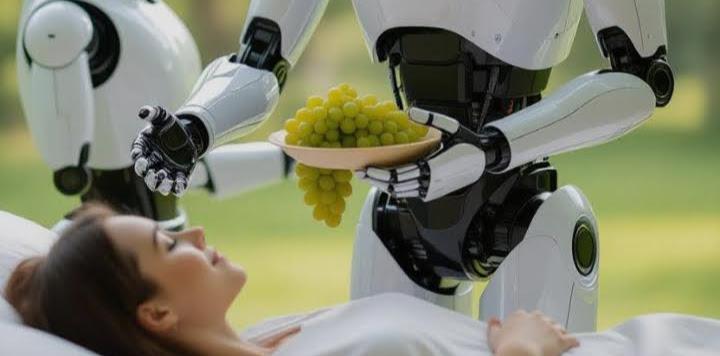Changing Humanity's Equilibrium Point
I propose that widespread automation, that is, robots and intelligences working in place of us humans, pushes us out of an equilibrium point that has been stable for quite some time - until we created, with our own dedication, those who work for us, increasingly, in more areas.
We were well balanced in creating children for the labor market, obedient and creative. Marriages maintaining procreation without interrupting the flow of workers going to work. Seniors don't bother those who work much. We could call this set of behaviors a stable equilibrium.
The parents themselves, always out of the house going to work early, encourage their children who, also early, sit down to study, which is, not coincidentally, a preparation for work, soon ahead.
If we don't write about it, we can safely assume that this -is- life. We get used to it. We balance ourselves.
Even logic, beyond intuition, can feel that our brain mass is much more elastic than settling into a single type of social equilibrium. It can adapt to many types of equilibria, can't it? There is no right answer, or right equilibrium, for a trillion synaptic connections that we have, each of us. Plus the willingness to connect. Our set of systems.
These previous paragraphs try to prepare us to be able to conclude that nothing prevents another equilibrium from appearing, to take the place of this previous equilibrium that has accommodated us for so long.
But if we create so much in the work equilibrium, with permanent innovations, why now would the innovation of automation change our social equilibrium? Wouldn't it just be another innovation within the social equilibrium, without changing our social equilibrium, as were the innovations of the car, telephone, internet (etceteras)?
We invented the car and didn't change the equilibrium of studying, working, retiring. Ditto for the telephone. Ditto for the internet (etceteras).
Why would widespread automation change our equilibrium?
I think it changes.
Why?
Because it breaks with the need for us to work. Now for real.
If this hypothesis is correct, what will this new equilibrium be like?
It doesn't make much difference trying to predict an eventual new equilibrium. It simply happens. It establishes itself. Futuristic texts, more or less correct, rarely manage to influence the new equilibrium point.
The new equilibrium point depends very little on abstractions about how it will occur, and much more on the balance of forces that will happen because it is no longer necessary to work - and, therefore, it is no longer necessary to study to work; and, therefore, it is no longer necessary to leave the elderly in ostracism; and a thousand other interactions of social and cultural forces.
But, for sport, we can try to imagine the direction, who knows, at least that, of this new equilibrium point.
The basis of the reasoning is that it is no longer necessary to work, or almost nothing to work, to obtain the thousand things that more and more machines, robots and artificial intelligences do alone, for our enjoyment.
We can discard a natural pessimism when facing changes to make the text less predictable, jumping straight to the new future. Children are very good at this: their new brains embrace the new, while previous generations often lament the new.
What will this new equilibrium point be like, using the embracing point of view of novelties from new brains?

The image of grapes being automatically served to us humans, lying down and relaxed, is only new because of the presence of the robot and the possible theoretical universalization of this happening to everyone.
Culturally, however, we know the image of a human being treated with all possible privileges, without the need for much, or any, work in return.
Culturally, this image resembles an (infinitely) rich heir.
Only instead of being served by other humans, now any human would be served by countless robots.
We would be - will we be? - heirs of the generations that, even today, work tirelessly to build this type of future.
It is more important to know that this scenario is not new, only the universalization of the scenario is new.
What would a culture be like in which we could all be heirs of infinite abundance?
That is one way to see automation in a very high degree of application, follow my reasoning: as an apple tree produces apples without the need for our intervention, only transforming sun, water and nutrients in the air and on the earth, robots and chips can, every day more, transform sun, water and nutrients into things that humans no longer need to work to make available.
Automation to a very high degree works like nature: it drops, "from the sky", as fruits fall from trees, nature skillfully transformed into objects and services that we want to make available.
Also like the example of the apple tree, production occurs in a self-sufficient cycle: the seed grows, creates the fruit that feeds or falls, fungi decompose, restarts the cycle.
We can assume that automation does a good cyclical dance with nature, every day more, with the intelligence of humans working today.
So that the heirs are really surrounded by "apple trees" that produce everything. Not just apples.
Now we arrive at a point of question: what will we want to produce?
Even knowing that everything will be self-sufficient, automatic, what will we want to produce?
That is a more advanced question, which skips the desire we have to manage intermediate problems, such as criticizing pollution, being uneasy at even imagining not needing to work to have everything, among other controversies that we like to meddle in so much - perhaps so as not to see what is ahead of the controversies.
For ahead of the controversies, that is, with the controversies resolved - let's suppose to see? -, we may not want to see what will be next.
Basically, there will be "grapes" while we are "lying down"?
Perhaps we will begin to perceive our prison of the senses: the sexual desire, the desire to run, play, participate in the dance that counts on the randomness of a ball in sports courts in various sports, the desire for awards, the desire to rest. (Etceteras).
We will end up realizing that our animal DNA is not ready to sit or lie down and receive "grapes" for a hundred years.
We can change our DNA. We can extend how long we live.
But in this case, with the designer's "blank paper", what desires will we place in the new species we create?
I advance to this subject because the conclusion of full automation is that we will perceive with even more force that we are animals in the midst of so much abundance. Prisoners of animal desires, primates, specifically humans, but animals.
But what if, then, we change our behavior? Our DNA, our programming, our biology?
Suppose possible, just for sport.
In this case we can leave the "animal prison": desires, compete, envy, anger, sex, irony, laugh.
Who will define the new design? Certainly consensus will be almost impossible. But someone boldly will design a new race to deal with total abundance.
No more dying, abundant food, abundant products and services.
What biology combines with this type of abundance?
A Buddhist would design a new race without desires. If there were no desires, would we not even need so much automation? Would a race without desires starve to death?
Desire can be a tool not to starve to death.
But in a world of abundance it is no longer necessary so much desire, so much struggle, to obtain things.
Could we then greatly diminish desire?
I stop here, but notice the fertile ground of possibilities.
Note, also, that my text does not hold or direct this destiny: we work, today, to have this total automation, compatible with nature, that is, permanent.
I don't see humanity turn around and go back.
I also don't see how to reconcile our animal side with total abundance - our desires will be without real objectives - and, likewise, I don't see a new biology designer being able to design something very different from a type of carbon robot, with almost no desire, to be quiet in the midst of so many grapes, apples, abundant products and services, without needing to writhe much, with fewer hormones. The absence of desire overturns the need for so much abundance, notably the brands that try to cause envy, power, all tied to great desires.
Shall we observe the transition of times?
The slow transition already offers us tips of new behaviors, every new morning. ☀️
